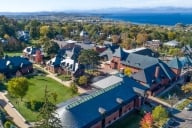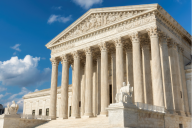You have /5 articles left.
Sign up for a free account or log in.
When the fall quarter classes started this term at Northwestern University,, one course was missing: Human Sexuality. That's not for lack of student interest. Human Sexuality is, not surprisingly, one of the most popular courses on campuses, filling up lecture halls every year. Nor is there an absence of a qualified teacher. A psychology professor, Michael Bailey, who has taught the class for years and would love to teach it again, is one of the world's leading experts.
Instead, Northwestern administrators have banned the class from being taught this year because it sparked an international controversy over a sex toy demonstration.
While Bailey still has his job and will be teaching other classes this fall, the same can't be said for another famous and controversial Northwestern professor, David Protess, who was suspended from teaching his Investigative Journalism class in the spring and agreed under pressure to retire this fall as part of a settlement with Northwestern.
Together, the Bailey and Protess cases represent an extraordinary violation of due process and the right to free speech on campus. In the two decades that I have spent studying and defending academic freedom in America, I have never encountered a worse attack on faculty freedoms at an elite university.
Should administrators have the power to ban teachers from certain classes, and even to ban entire classes, because those professors have caused controversy? One might have thought that this question was settled long ago, that the freedom to teach deserves clear protection. But the Northwestern administration has put this liberty very much into doubt.
The controversies that led to the removal of these professors from their classes at Northwestern have filled the front pages of newspapers. Michael Bailey's crime was allowing two guest speakers at a voluntary extracurricular event after a class to engage in sexual activity utilizing an oscillating saw fitted with a dildo. Protess's misdeed was being accused by administrators of lying to them about which student memos concerning wrongly imprisoned criminals had been turned over to defense attorneys. Both professors have expressed regret for what happened (Bailey for allowing the event to occur, and Protess for his faulty memory).
While Northwestern administrators were dealing with the fallout from the sex demonstration in March of 2011, they undertook another startling attack on faculty rights by removing Protess from his journalism class. Protess, who taught at Northwestern for 29 years before retiring on August 31, 2011, may have been the most prominent and admired professor at the university. His classes investigating the innocence of wrongly accused felons helped free many imprisoned individuals, including some from Death Row, and ultimately helped lead to the end of the death penalty in Illinois.
Northwestern's faculty handbook is very clear on the rules and procedure for a suspension: "If the university believes that the conduct of a faculty member, although not constituting adequate cause for termination, poses a sufficiently grave infraction of the principles of academic freedom or of faculty responsibility to justify suspension from service for a stated period or some other severe sanction, the university will follow the procedures below in conducting proceedings that may impose such sanctions."
The removal of a faculty member against his will from a regularly scheduled class due to allegations of misconduct is the definition of a suspension. Although the administration can schedule classes, the removal and replacement of a teacher less than two weeks before a class begins, for no reason other than allegations of misconduct, cannot be anything other than a suspension.
In the case of a suspension or termination, the faculty handbook requires a "reasonably particularized statement of charges against the faculty member by the president of the university or the president’s delegate." These charges "shall be referred to the Faculty Committee on Cause for mediation." If no resolution is made, then the administration can continue proceedings before the University Faculty Reappointment, Promotion, Tenure, and Dismissal Appeals Panel (UFRPTDAP).
What is most notable, however, is the failure of Northwestern to follow its rules on temporary suspensions: "Pending a final recommendation by the panel, the faculty member will not be suspended or assigned to other duties in lieu of suspension, unless immediate harm to the faculty member or others is threatened by continuance." Not only is there no evidence of "immediate harm" compelling a suspension in the Protess case, but a temporary suspension cannot take place without the first stages of the suspension process — a written statement of charges — being made. Nor does it appear that the required consultation with the UFRPTDAP committee was ever made, as is required: "If the administration wishes to suspend a faculty member pending an ultimate recommendation on the faculty member’s status through the hearing procedures, the administration will consult with the UFRPTDAP Executive Committee concerning the propriety, the length, and the other conditions of the suspension."
The American Association of University Professors, in a letter to Northwestern, noted that the administration's approach "appears not only at odds with AAUP-supported standards of academic due process but also in conflict with the university's own applicable policies and procedures."
Northwestern administrators seemed genuinely angry at their belief Protess lied to them. But a Chicago magazine article noted that Protess was one of the leading faculty to criticize his dean, John Lavine, against the administration's changes to the curriculum. Protess was the most prominent professor criticizing Lavine when the dean was accused of inventing an anonymous quote from a student praising the university. Of course, there is no proof that Northwestern administrators retaliated against Protess for humiliating them, just as there is no proof that Protess intentionally lied to them.
Whether Protess was forced out of his job because administrators had a personal gripe against him, or because they felt that allegations about his integrity demanded it, they never obeyed the process they're obligated to follow in the Faculty Handbook. To this day, Northwestern has never produced any evidence that Protess intentionally lied; the worst "smoking gun" they announced to the media was an e-mail where Protess corrected a misstatement and informed administrators that he had altered it.
If the Northwestern administration's attacks on Protess reflected anger at being deceived, the attack on Bailey was a matter of public relations and the fear that conservative alumni were offended by an extracurricular event on sexuality. In its immediate response to the Bailey case, the Northwestern administration offered a solid defense of academic freedom, proclaiming, "Northwestern University faculty members engage in teaching and research on a wide variety of topics, some of them controversial and at the leading edge of their respective disciplines. The university supports the efforts of its faculty to further the advancement of knowledge." Then it immediately retreated. President Morton Schapiro accused Bailey of "extremely poor judgment." It is highly unusual for a university president to condemn a professor for a harmless extracurricular event, but it is not a violation of academic freedom.
However, with its next action, the administration moved from criticism to censorship. Schapiro announced, "I have directed that we investigate fully the specifics of this incident, and also clarify what constitutes appropriate pedagogy, both in this instance and in the future." The attack on Bailey's “pedagogy” was particularly misguided because this didn't happen in his class. As Bailey noted, "These events are entirely optional, they are not covered on exams, and I arrange them at considerable investment of my time, for which I receive no compensation from Northwestern University."
On May 9, 2011, Northwestern's administration announced that the department of psychology would not offer Bailey's “Human Sexuality” class in the 2011-12 academic year, and that the university would examine whether the course would be moved to another department in the future: "Courses in human sexuality are offered in a variety of academic departments in other universities, and Northwestern is reviewing how such a course best fits into the university's curriculum.” The university also announced then that the investigation into Bailey "continues, and is in addition to this." (Northwestern declined to comment on who conducted this investigation of Bailey and whether it is still ongoing.)
No one can plausibly argue that scholarly expertise demands that human sexuality instead be taught in another department by another professor. As Robert VerBruggen noted on the National Review blog Phi Beta Cons, “This seems like an overreaction to me; human sexuality is an important field of study, and Bailey is one of the nation’s leading experts.”
Back in the mid-1990s, I visited Antelope Valley Community College in the middle of Orange County, California, one of the most conservative areas in the country. I was invited to speak about my first book, The Myth of Political Correctness: The Conservative Attack on Higher Education, by an instructor who had taught the class on human sexuality until an offended student contacted a local legislator who convinced the administration to ban the class from being taught until it was re-evaluated to determine if it violated sexual harassment policies. At the time, I was upset by this attack on academic freedom, but I understood how political forces at a college in a conservative community could overwhelm the values of intellectual liberty. I could not imagine that 15 years later, officials at one of the leading private universities in the country would make the exact same move to ban a course on human sexuality because it sparked publicity.
This fall, Antelope Valley College is offering three sections of “Human Sexuality” in its psychology department.
The irony of the Protess and Bailey cases is that for years Northwestern had been a paragon of protecting academic freedom by resisting the intense pressure to fire Arthur Butz, a Holocaust denier since 1976 who continues to teach in the department of electrical engineering and computer science, and has never been punished by Northwestern for his despicable and idiotic views. No other university in history has ever defended a professor with views this unpopular for such a long span of time. This remarkable record makes the Protess and Bailey cases even more incomprehensible. Why would Northwestern suspend one of their most admired professors without due process for allegedly lying to protect his students, but do nothing against a Holocaust denier who has used the prestige of his title at Northwestern to help spread lies defending the Nazis?
I always admired Northwestern for its longstanding principled defense of Butz's academic freedom. Those principles have been abandoned by a university more interested in PR than due process and intellectual freedom.








